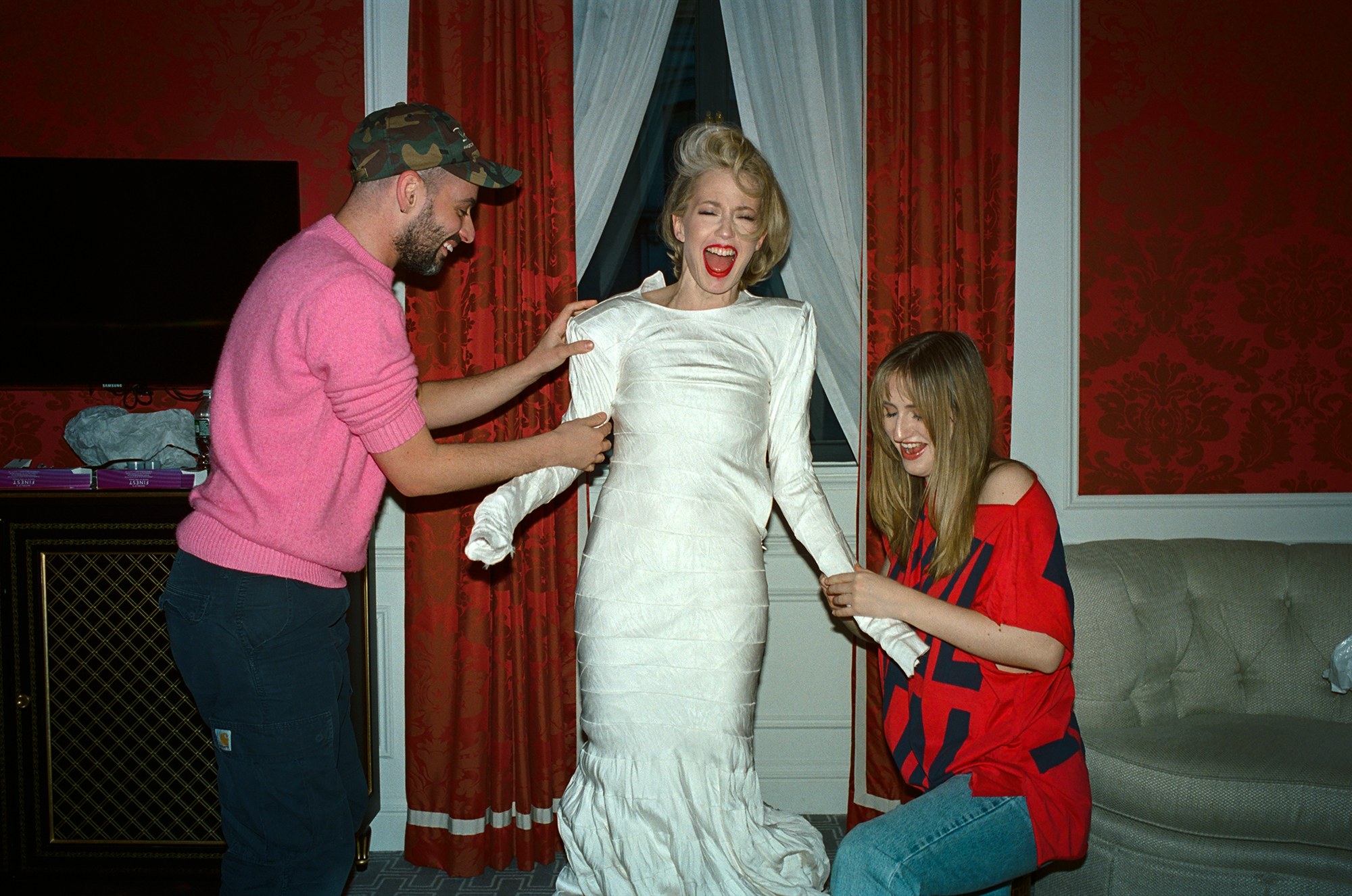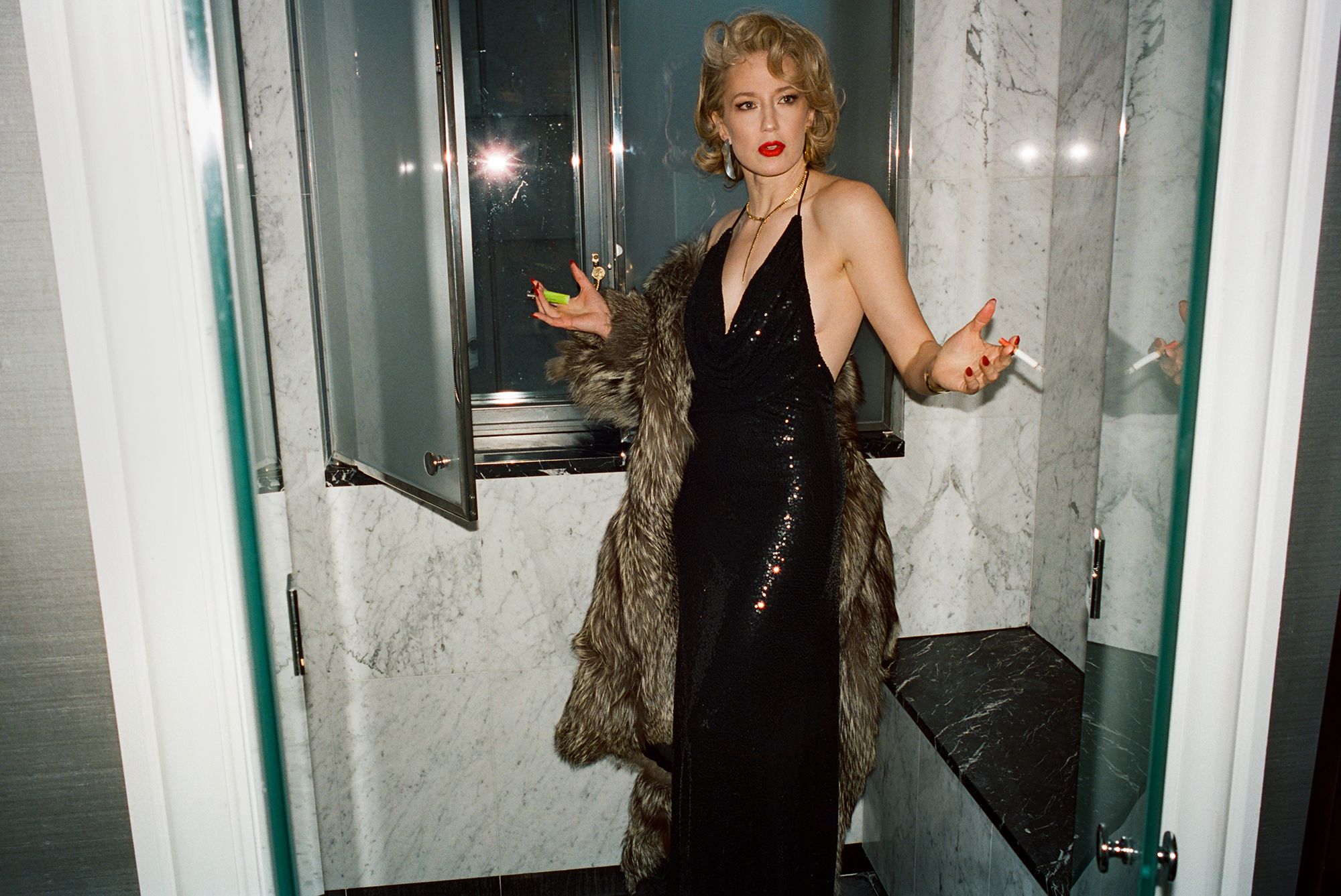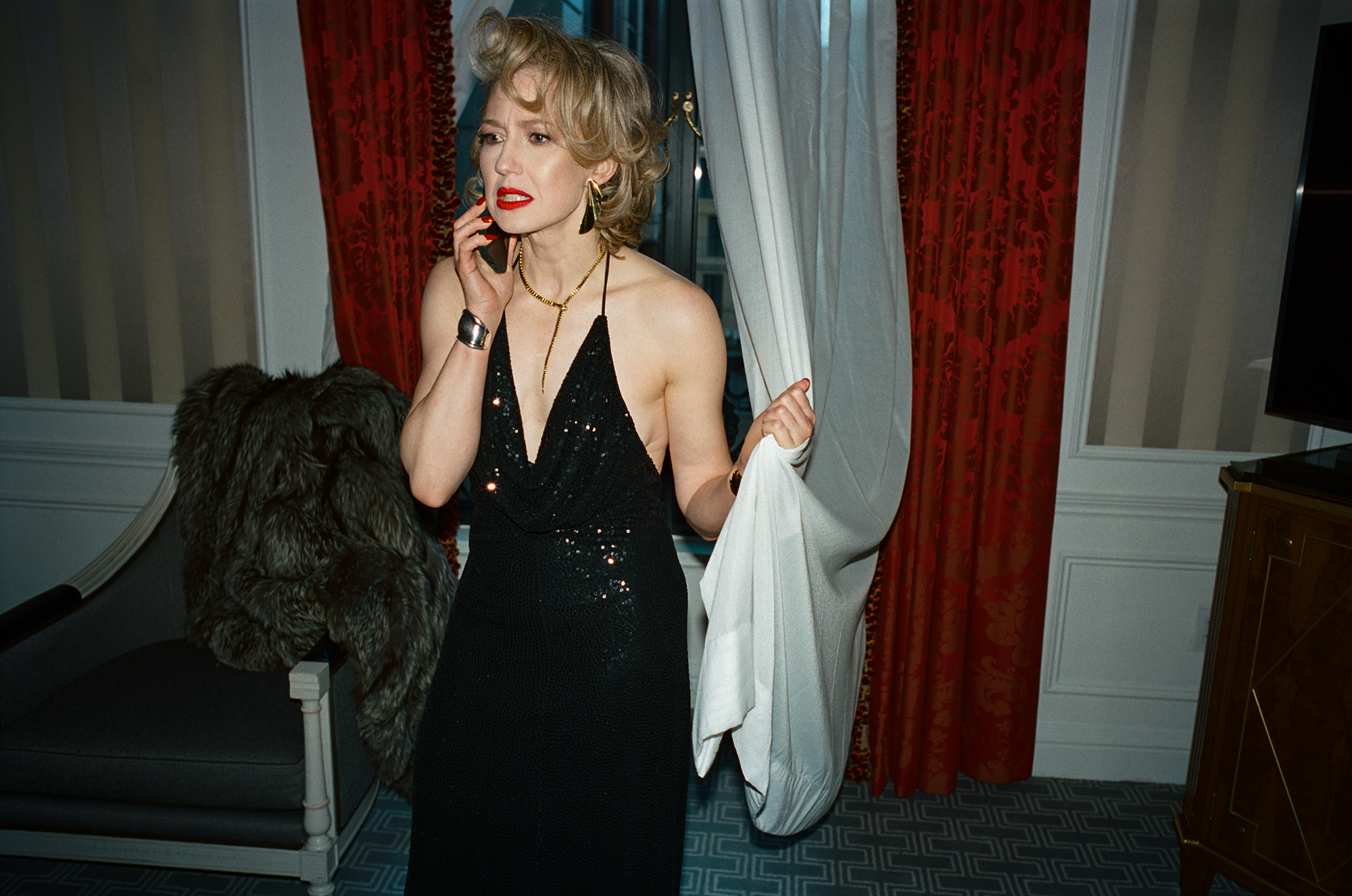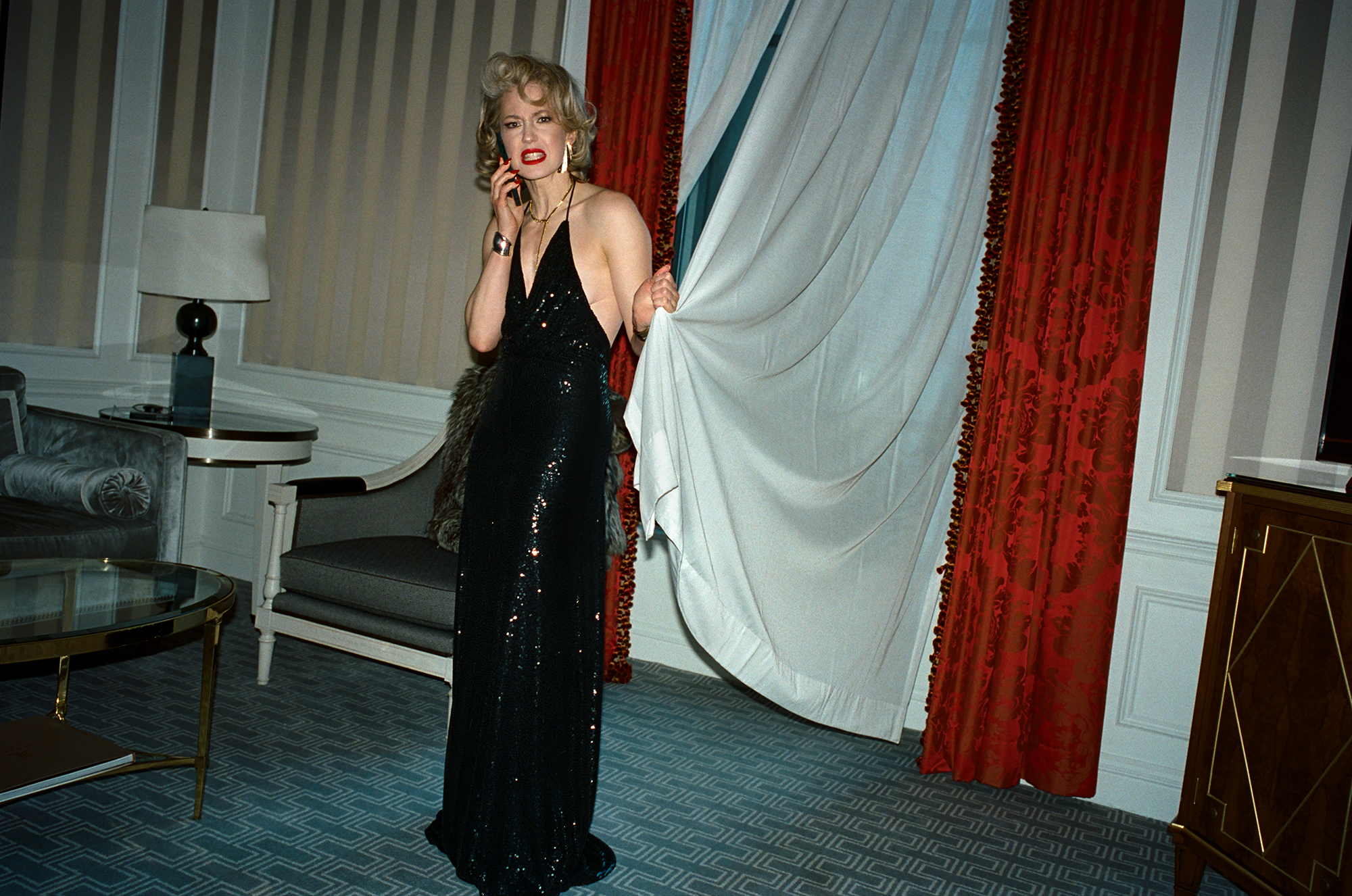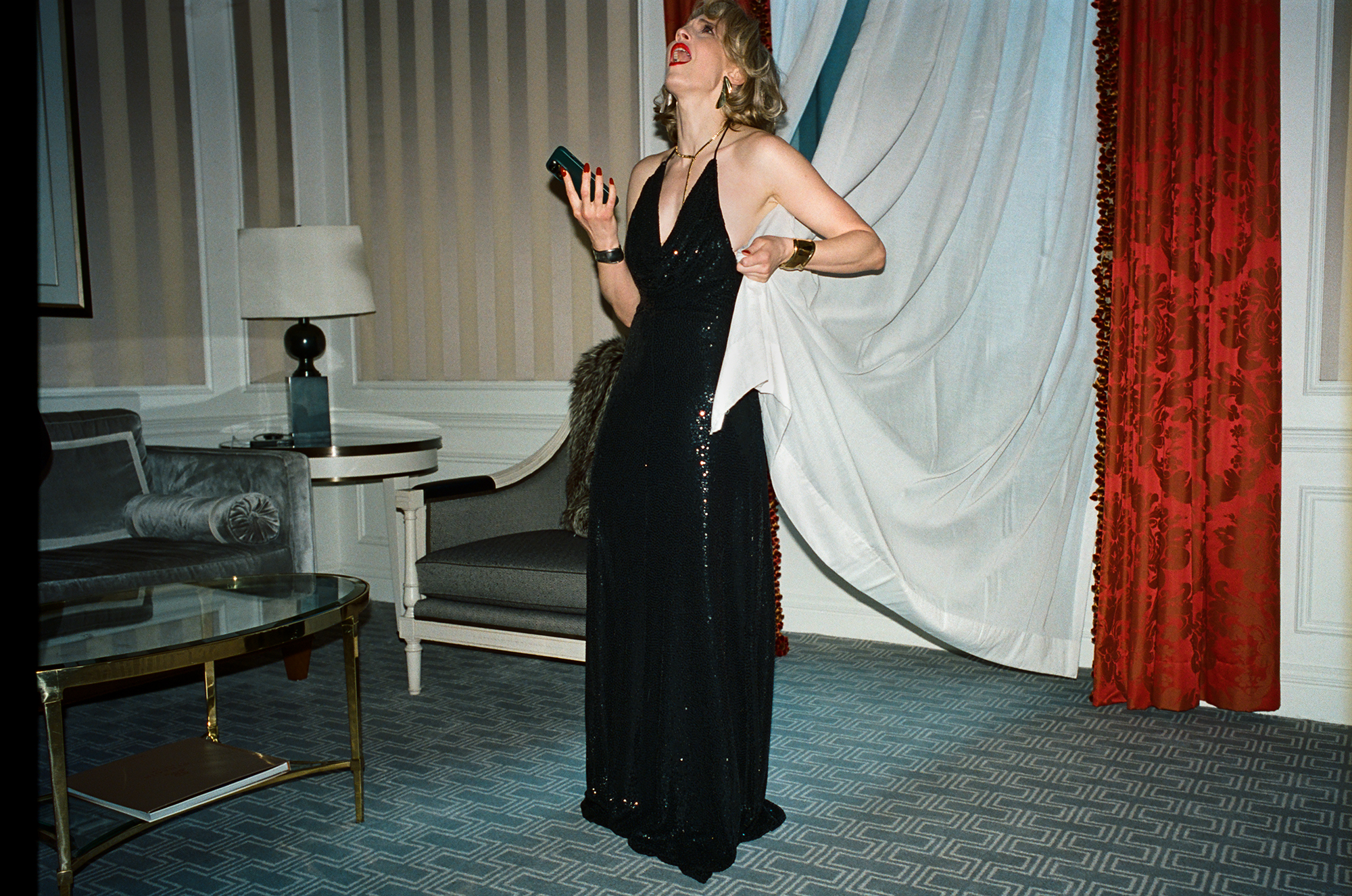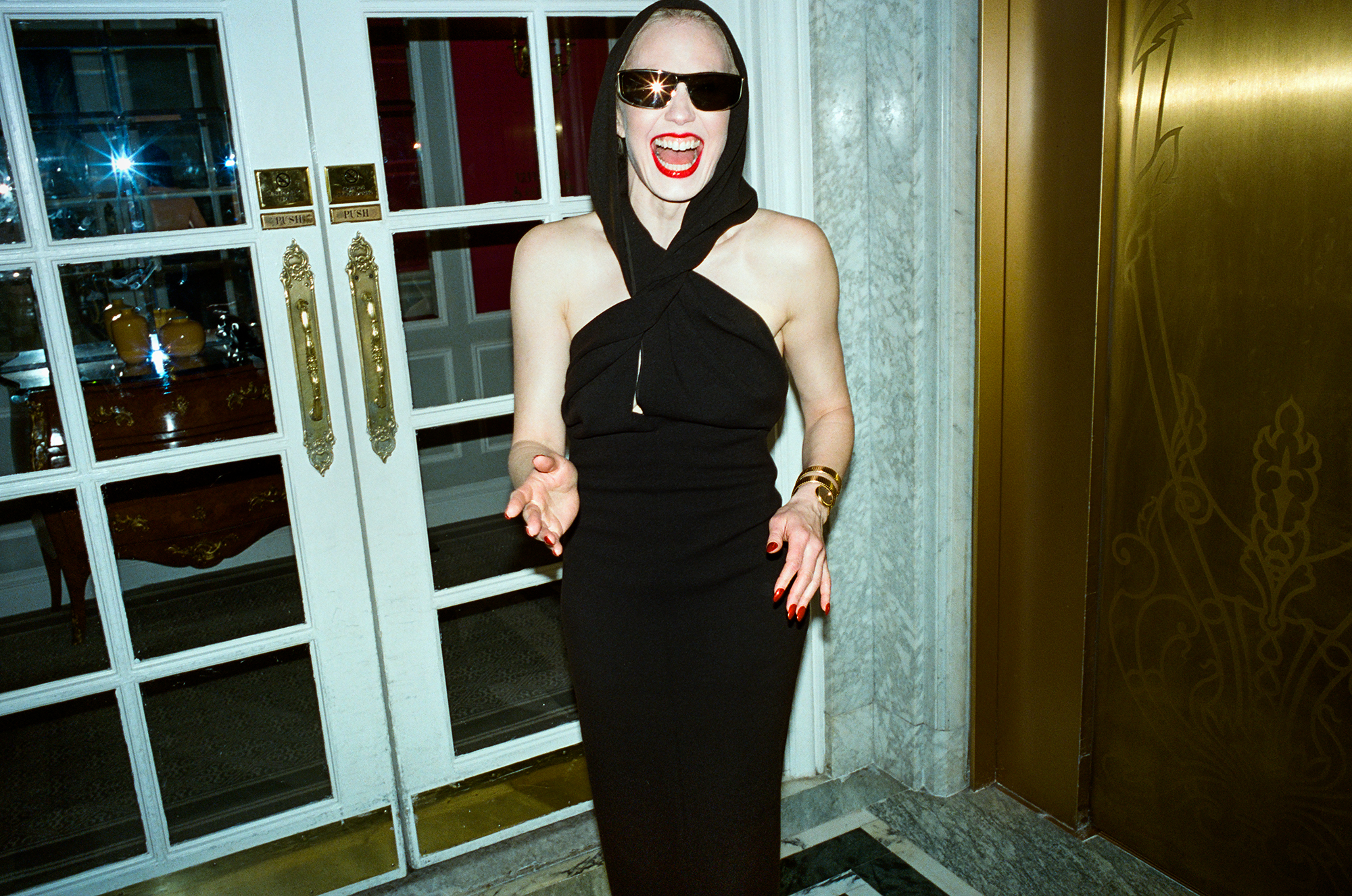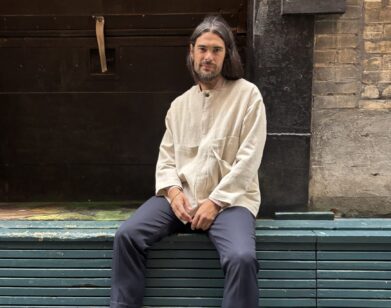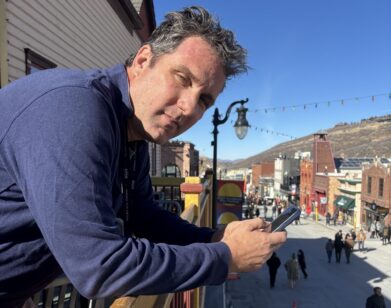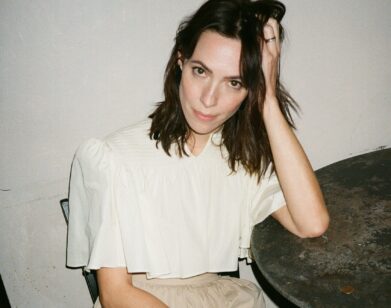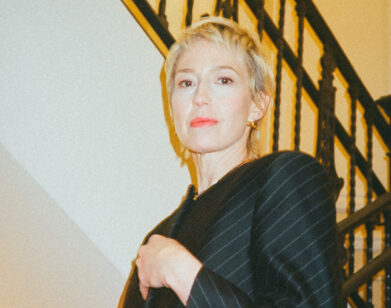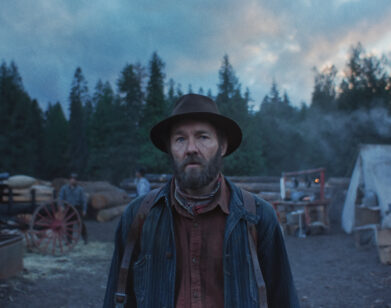actor
Carrie Coon and Christine Baranski on Champagne Problems and Corsets
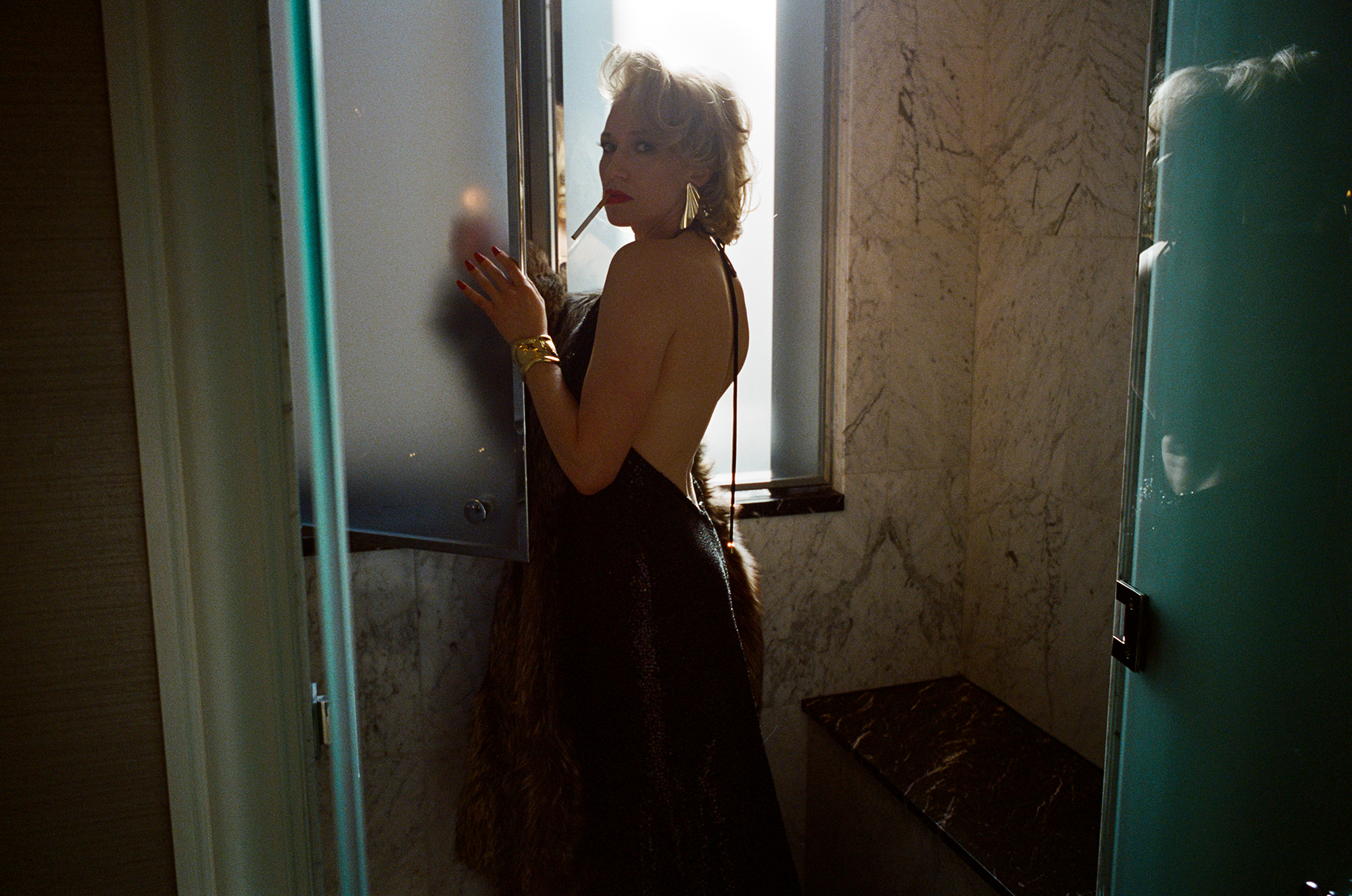
Carrie Coon wears Dress Michael Kors Collection. Earrings and Cuffs Tiffany & Co. Coat Stylist’s Own.
When Carrie Coon joined Christine Baranski on Zoom from New York City, it served as an instant reminder of what these two talented actors do for a living. On their HBO costume drama The Gilded Age, they crush it as fierce rivals, but in real life it was all love as they traded war stories about two of the biggest but most rewarding challenges of their careers: motherhood and corsets.
———
TUESDAY 2:57 PM FEB. 16, 2023 NYC
CHRISTINE BARANSKI: Well this is audio only, so I look like hell.
CARRIE COON: Oh my god, Christine, I didn’t sleep last night.
BARANSKI: Oh, darling, I just don’t know how you’re doing it. Aren’t you leaving for London?
COON: I leave on March 20th.
BARANSKI: Wait, have we started this interview?
COON: I guess we have. [Laughs]
BARANSKI: I mean, you’re such a girlfriend. I could just schmooze with you forever, but—
COON: I know, I want to talk to you about your life. But yeah, things are crazy right now. You know.
BARANSKI: I know. I sat next to Morgan Spector at the Thom Browne fashion show and he said you were leaving for London soon to film. And I said, “With the kids?” And he said, “With the kids.” And I thought, “Oh, whoa. Been there, done that.”
COON: Right? I knew if anyone had done it, you had.
BARANSKI: Listen, I’ve had the pleasure of spending quite a few days watching so much of your work in advance of this interview, and I am just such an admirer.
COON: Well, thank you!
BARANSKI: You have such honesty and depth and presence as an actress on film. It seems like you’re a born film actress. And yet, like me, you did mainly theater before doing all this film work. So it seems you made an abrupt jump into cinema. Can you speak of that a bit?
COON: It was abrupt. I was fortunate to be in a production of Who’s Afraid of Virginia Woolf?—where I met my husband [playwright, screenwriter, and actor Tracy Letts]—that happened to go to Broadway, and I got a Tony nomination. And being in New York just opened the possibility of meeting with casting directors in a scope I hadn’t experienced. At that point I’d done a few commercials in Chicago, and then I did one guest spot on The Playboy Club on NBC that I think aired three episodes before it got canceled. That was all my experience. And I had not learned any of that in school. I don’t know how your program at Julliard was, but they were not teaching us that in Wisconsin.
BARANSKI: No, nothing about a camera at Julliard. It was stage, darling. And then we had to shed all our training to be real people. [Laughs]
COON: Exactly. I just tried to not move my face at first on camera. Right? “Just don’t move.” [Laughs] It’s so absurd. And then it’s like, “Oh, actually a little movement is helpful so they know you’re alive.” And I started booking things. But I was—
BARANSKI: Suddenly working with David Fincher.
COON: Well, what happened was I went in and auditioned for [The Leftovers co-creator] Damon Lindelof and got cast. We just didn’t know if the show was going to be picked up. And then around that same time, I’d gone back to Chicago after the Tony Awards, and the audition for Gone Girl came in. I made a tape in my living room and then I went off to a wedding in New Orleans. I got a call when I was in New Orleans that weekend, “Can you be in L.A. on Monday to meet with David?” So I flew to L.A. and ended up meeting with casting agents out there, and then they put me off for about a week. I wasn’t allowed to meet with David because they didn’t know if The Leftovers was going to be picked up, so they didn’t know if I was available. I think I changed my flight two or three times as we waited. Then, the Friday before I left town, I sat in a room with David and read all the scenes on camera and he gave me adjustments. And it was very inscrutable. [Casting director] Laray Mayfield gave me a Danish from the bakery downstairs and said, “You did a good job.” But then I didn’t hear anything for about ten days because they were waiting on HBO to figure out if they could clear me for the film. That was the first movie I ever made.
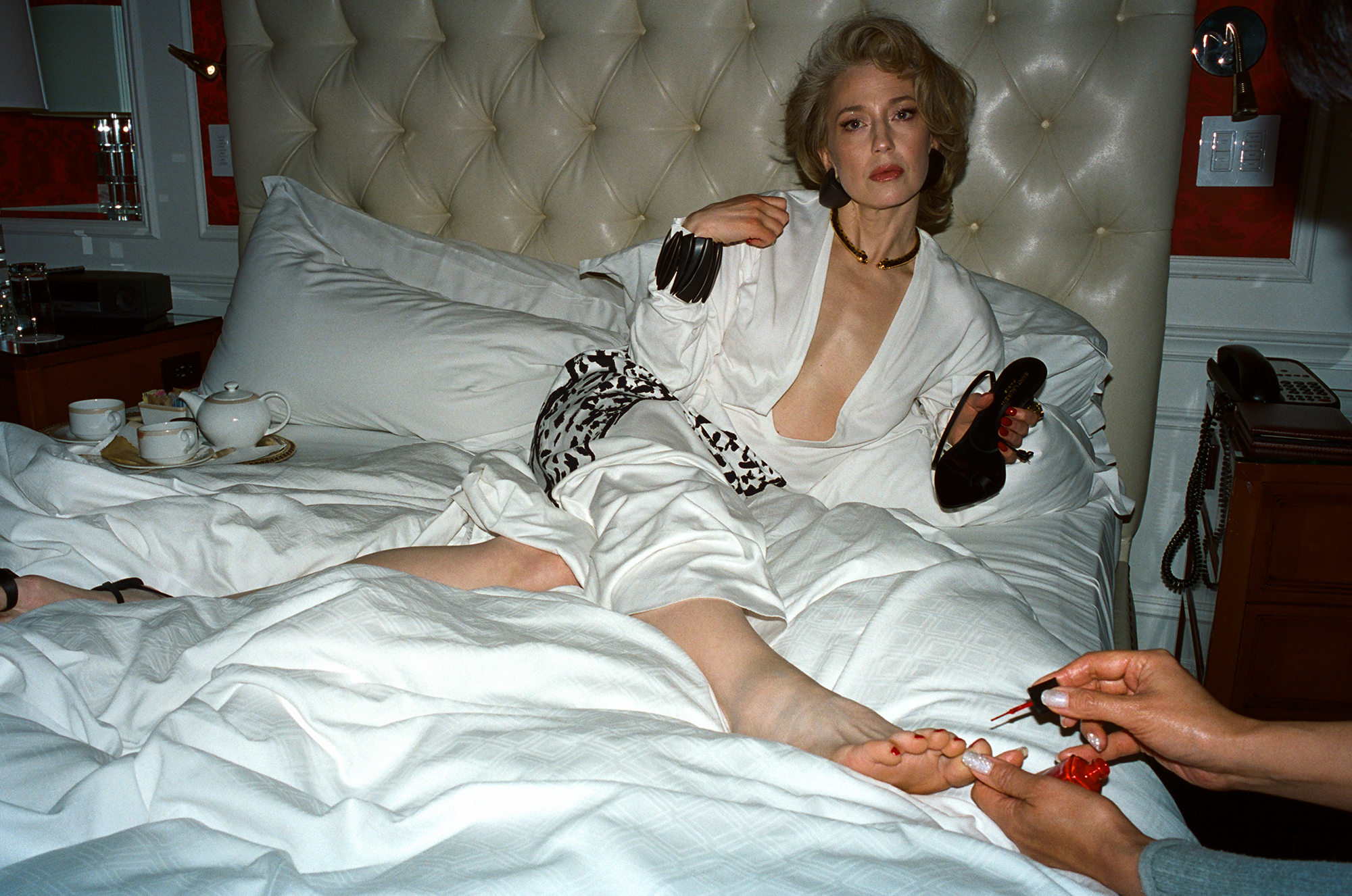
Dress Ferragamo. Earrings and Bracelet Monies. Necklace and Ring Cartier. Shoes Saint Laurent by Anthony Vaccarello.
BARANSKI: David Fincher apparently does many takes.
COON: Oh, so many. And I wanted all of them. I needed all of them. I was still learning.
BARANSKI: Right. But when you do multiple takes, do you feel like the director’s not happy and therefore he wants more takes? Or is it just an opportunity to get more subtle or to show him an infinite number of choices? Usually, you don’t get multiple takes. The director’s like, “Moving on.”
COON: That’s right, especially in TV. What’s interesting about David is, you realize that he’s like an athlete who sees the whole field. And so you will do well if you don’t make it about you until it is about you. Keep doing what you’re doing until David comes stomping over to you and gives you an adjustment because he’s seeing at such an incredible level of detail. I remember that one time the DP said, “I have your frame set up. Come take a look.” And David said, “That’s not my frame. My frame has 12 rafters and yours has 13.”
BARANSKI: Whoa.
COON: But you know how it is. As a young actor, it’s very easy to get in your own way.
BARANSKI: It’s a lifetime process of getting out of your own way on stage and on film.
COON: Definitely.
BARANSKI: You’re such a marvelous interpreter of contemporary roles. What was it like for you to take the jump into this period drama, which we both share, The Gilded Age? It’s rather like they wanted theater actors, but then all of these theater actors were in front of a camera trying to figure out how to give film performances, right?
COON: [Laughs] Yes. And I have done period work, of course. What theater actor who did summer stock hasn’t been swanning around in a corset? I think my muscle memory was for an 1,100-seat outdoor theater, so it took a little calibration. And I’m not sure I’ve quite sorted it, frankly.
BARANSKI: Well, I think we’re all still working it out. And then we have these insanely long hiatuses. So just as you really get into it and you’re an ensemble and you’re flowing, then the ten episodes are up and we’re going to have a very long wait yet again. So that’s another challenge with all this streaming stuff. I mean, the good news is you have free time, but then it’s like, do we really want that much time?
COON: I know exactly what you mean. I always say it’s like putting on a wet bathing suit. You know it’s your bathing suit, but it’s so uncomfortable.
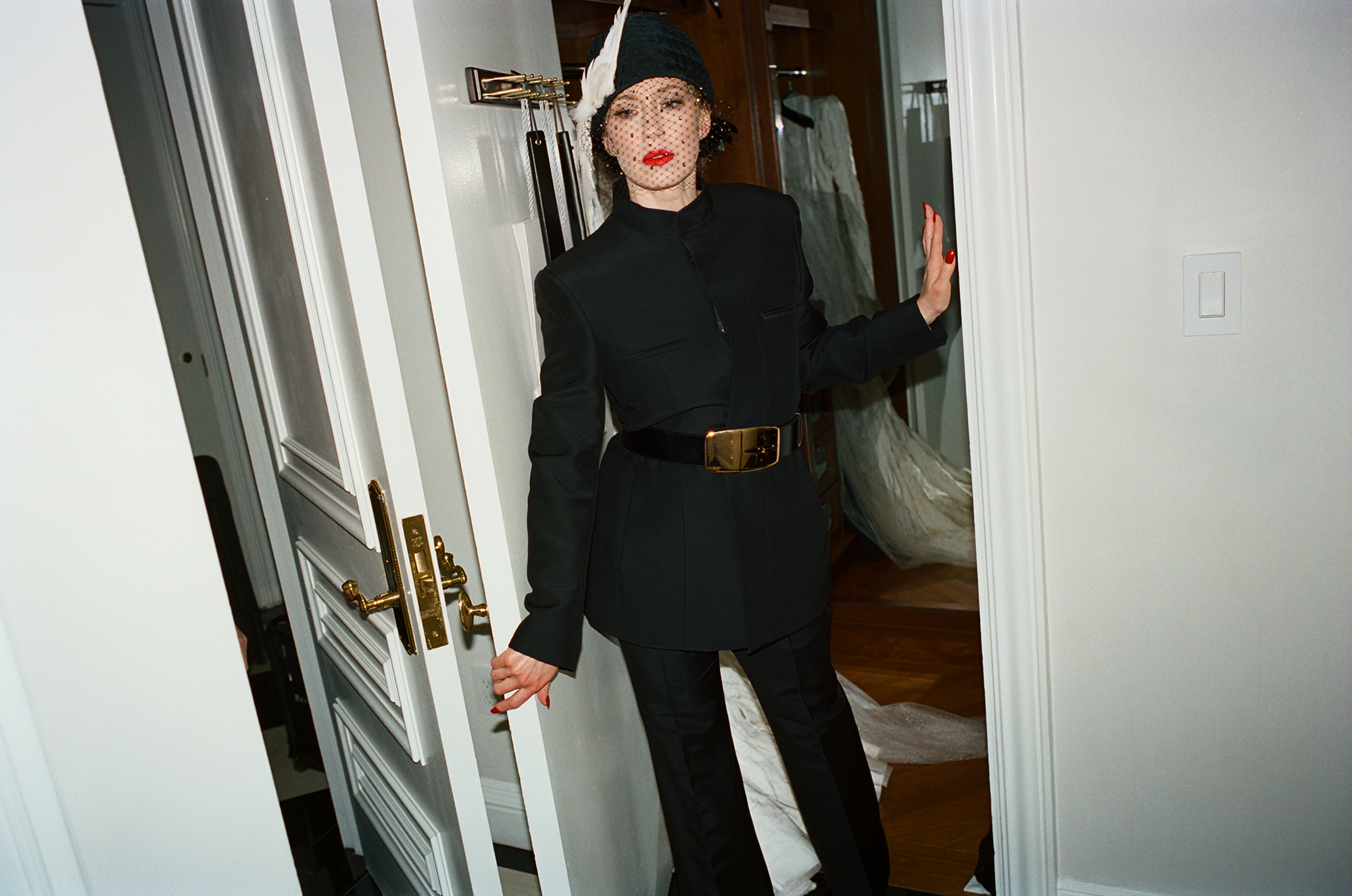
Jacket, Pants, and Belt Gucci. Hat Heather Huey. Veil Tia Mazza. Brooch (worn on hat) Stylist’s Own.
BARANSKI: [Laughs] You must have some stories about working in a corset and a wig. In your first season you got pregnant—any favorite stories about what that was like? It’s hard enough to do long hours on film in a corset. But I so admired you getting through that season.
COON: Thank you. I have to say all the credit goes to the costume department, who didn’t blink. I’d just had a lovely series of fittings with a very trim waist from having been chasing a toddler for three years, and then we had to tell them they had to reimagine every look. For example, there’s that red opera gown I wear. That was the first month of shooting, and then the next time I wore it, I was eight months pregnant. So you cut to me on the stairs in the opera house—and I ate a rack of ribs that day for lunch!—and I stand up and you see me just flip the fan out so you can’t see around it to the giant belly. I couldn’t wear the corset for very long, so suddenly I was the most comfortable woman on set to some degree. But what you discover is that it’s the heels that kill you.
BARANSKI: So, you now have two little ones. And in your case, as with so many careers, mine included, everything’s happening at once. The years in which you have to create a family are the years in which your career is taking off. It’s supremely challenging, and there’s not an asterisk or something at the bottom of the screen that says, “This shot was filmed with no sleep,” or, “This close-up was shot at 2 a.m.” And when you watch your work you think, “How did I even get through the day?” But somehow you do. When people ask my advice, I say, “Above all you need your health. You need stamina. And, oh my god, you need such a sense of humor.”
COON: Which is one of the things I admire about you, that you could be so elegant and refined and classy but hilarious and easy and gracious. Because you’re right. You have to be or else it’s the end.
BARANSKI: Yeah, you’re always shifting your weight. But honestly, these are what are called “champagne problems.” “Oh, I have two beautiful children, a devoted husband, and a major career.”
COON: And that’s the other thing I think is important to remember, is to be grateful. It’s so easy to lose touch with gratitude when you’re tired.
BARANSKI: It is. But even though we’re so blessed, it’s an extremely difficult thing to do both. I say there are actresses and there are actresses who have families. It’s a whole different construct.
COON: When I was doing Boston Strangler with Keira [Knightley], we were both in Boston with two kids. And it was just, every morning, both of us walking in, probably not well slept, and not really knowing what scene we were doing. We just had to accept that it was going to take us a bit of time to warm up and everyone was going to have to be patient with us. We would get there eventually, but we had to give ourselves permission to accept where we are in our lives. Or else you’d have to say no to everything.
BARANSKI: What’s the most scared you’ve been as a performer? I’m always fascinated by actors’ terrors, because they’re so acute.
COON: If Tracy were sitting here right now, he would say, “My wife doesn’t get scared.” He always says that I have ice water in my veins. I feel that my fears creep in when I’m not working, but I’ve always been very open to the opportunity that’s in front of me and felt as though it’s something that has come into my life at the right time. I’ve been really fortunate that it’s generally been a great marriage of character and human being. And so I’ve been open to whatever it is that those roles have to teach you about yourself. Also, I do believe in acting. I don’t get held hostage by a role. I’m pretty good at leaving it at work.
BARANSKI: Yeah, you wouldn’t want to bring that home, some of those ladies you’ve played.
COON: No, thank you. But as you know, so much of it is about your own expectations for yourself. That’s where I can get into trouble, when I start to doubt my capacity. And maybe you’ve had this experience too, but the thing that you’re afraid of is never the thing that ends up being hard. It’s always something you didn’t see coming.
BARANSKI: It’s so true. I do think that as we get older, it’s a great gift to an actress to have life experience. I probably did my best work on film in my last ten years, because life has so much to teach us. This business of “a shelf life” for an actress is just completely false. We have so, so much to give. Being mothers, being wives, being friends. People die, people leave you. I won a Tony for The Real Thing, and I had just gotten married but was playing a woman who had been married and whose husband cheated on her and who had a teenage daughter. I didn’t have any of that life experience, and I read the play again with Mike Nichols—he was thinking of doing a revival—and I just thought, “My god. Back then I knew nothing about the depth of what this play was.” So it’s sort of a miracle that I actually won a Tony for it. I thought, “Man, was I faking it.”
COON: It’s so funny, isn’t it? How you thought you had investigated something until you come up against it in your life and you think, “Oh gosh, actually that didn’t go very deep at all.”
BARANSKI: Right.
COON: Did you ever feel like you wanted to quit or had to quit, when you were a young mother in particular?
BARANSKI: No, not for a second.
COON: I really admire that.
BARANSKI: I was also the breadwinner. I was paying bills by being a theater actor. But, no. Do you have any desire to do a comedy? I think you would be kick-ass.
COON: My grandma always wanted to see me do Born Yesterday. My family cannot for the life of them understand why I ended up in this career that is filled with these dramas and these sad, lugubrious women. They find it shocking. When I got cast in Ghostbusters: Afterlife, Jason Reitman actually called several of the directors I’d worked with and asked, “Is she funny?” And they all said, not to pat myself on the back, “She’s the best kind of funny. We love having her on set.” I think directors often, if they’ve seen my body of work, expect me to be this very serious person.
BARANSKI: Our characters in The Gilded Age are such archenemies that I don’t often have the pleasure of your company in the makeup trailer or on set. But whenever I’m with you, you’re just the most fun person.
COON: Spread the word! [Laughs]
BARANSKI: So in between takes, are you able to just drop the whole thing and then come back to it? When it’s painful stuff, do you need to stay in the zone?
COON: For my work on The Leftovers—as you pointed out, often we are asked to inhabit an experience we have yet to live through—the burden of playing a woman who had lost her children felt really serious because at that time I didn’t even have children to lose. And so it felt like a false note would be not only insulting, but damaging in some way. So in that case, I felt that it was important to inhabit grief in between takes to stay in the moment as much as I could. And I had some touchstones for that. I feel like my process has gotten so much more outside-in than it was when I was a younger actor. I’ve always had an intellectual way into the work, but now it’s becoming more of an embodied one. But yes, I drop it in between and I joke around and I jump back in, because ultimately what I’m looking for is presence. And to be present is to be present with the people that are there right then. Honestly, I think about death a lot on set. Is that weird?
BARANSKI: You think about death a lot?
COON: Not in a bad way, but in a way that really moves me. Sometimes I look around at everyone who’s working so hard, and they’re all at different stages of their careers and lives. They were all children once and they’re all going to die. And it feels so moving to me that there we are in that moment, collected. It’s something I weirdly think about a lot that actually keeps me present.
BARANSKI: Well, what we do is the art of being conscious. The art of being human. And I’m sure you and Tracy feel this: What are we doing? Are we doing enough as artists? Are we keeping people awake or are we putting them to sleep? Because there are so many compelling problems. But when I see great work or when I go to the theater and have that feeling of people being present and living in front of me, I think, “What is more important but that we stay awake and stay human?” Because it’s pretty scary what’s going on with children in front of screens and AI and disinformation. You think, “Are we actually going to lose the ability to just be present for each other?” So I know what you mean by that, by looking around and saying, “Wow, we’re all mortal.” And how beautiful it is just to be.
COON: Storytelling is the oldest profession, really. And it’s important to remind everyone that there’s nothing more stirring than a real face-to-face exchange. We just have to make sure it’s accessible. We have to make sure that it doesn’t become an elite art form because people can’t afford it. Because we can’t afford to make it in a country that’s fundamentally hostile to the arts.
BARANSKI: I know.
COON: Everyone’s fighting for the same dollars.
BARANSKI: Yes, exactly. And for the audience, too. Just getting people in seats now—getting them to show up when they’d rather just stay home. Well, we’re going to keep fighting the good fight then, aren’t we darling?
COON: We are. You have a little bit of the good fight left in you, don’t you?
BARANSKI: Yes, I do. I think I’m going to be on quite a nice hiatus. But I plan to read and experience other people’s work and maybe become empty so as to refill. And when I see you again—I can’t wait. I won’t see you for a year.

Dress Fendi. Earrings, Necklace, Watch, and Ring BVLGARI. Sunglasses Tom Ford. Flower Ms Schmalberg.
COON: I know, that’s crazy.
BARANSKI: But I just wish you the best with your film projects, and if you have time to, enjoy London. It’s my favorite city.
COON: It’s Tracy’s favorite city too. I’ve been there a little for work and on vacation, but he really had some formative years there. He would move there tomorrow, honestly.
BARANSKI: And he’s going with you?
COON: He is. The whole family’s going. It’s a family adventure.
BARANSKI: Alright, darling. I’ll leave you to it. I thank you for your time and I’m sure all will be well because you are who you are.
COON: I can’t thank you enough for doing this.
BARANSKI: Oh my god, darling. It was so wonderful talking to you. Try to get some sleep.
COON: I will. Take care.
———
Hair: Levi Monach at Kramer + Kramer
Makeup: Jamal Scott using CHA at Art Partner
Nails: Nori using Chanel Beauty at See Management
Fashion Assistant: Emmalynne Walpole
Makeup Assistant: Hinako Takagaki
Location: The St. Regis New York

